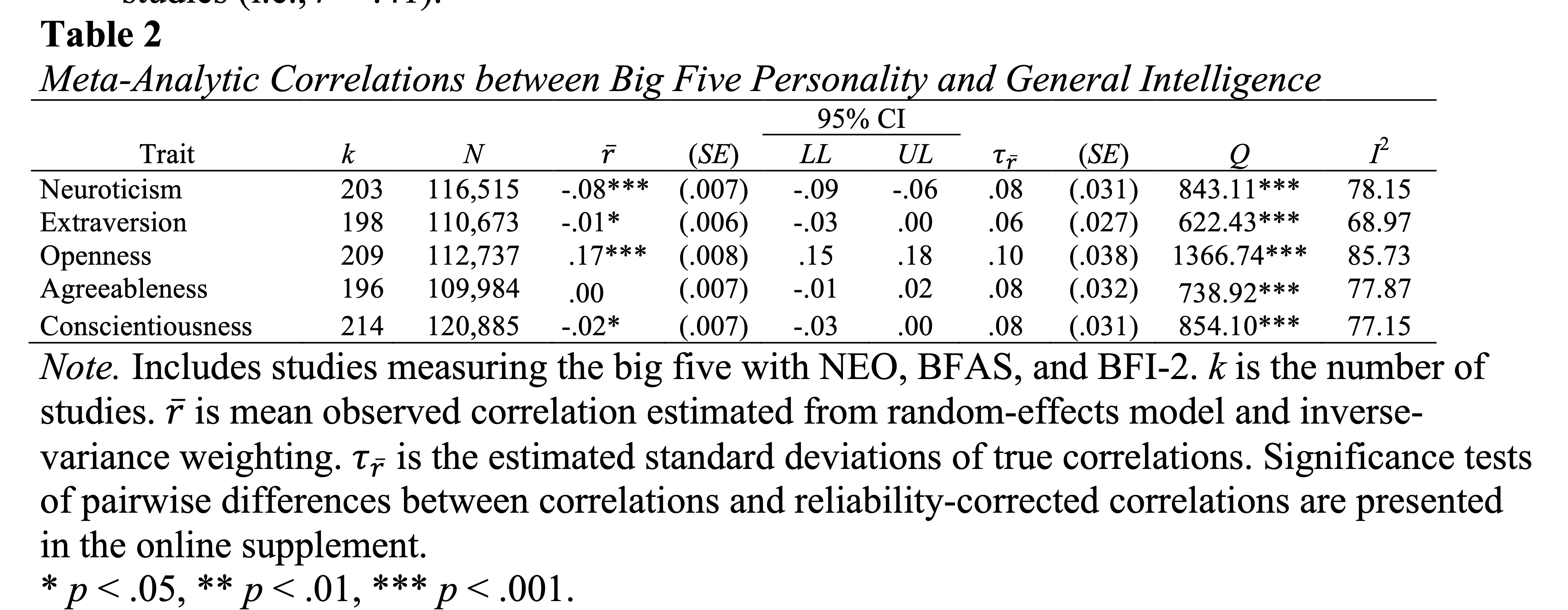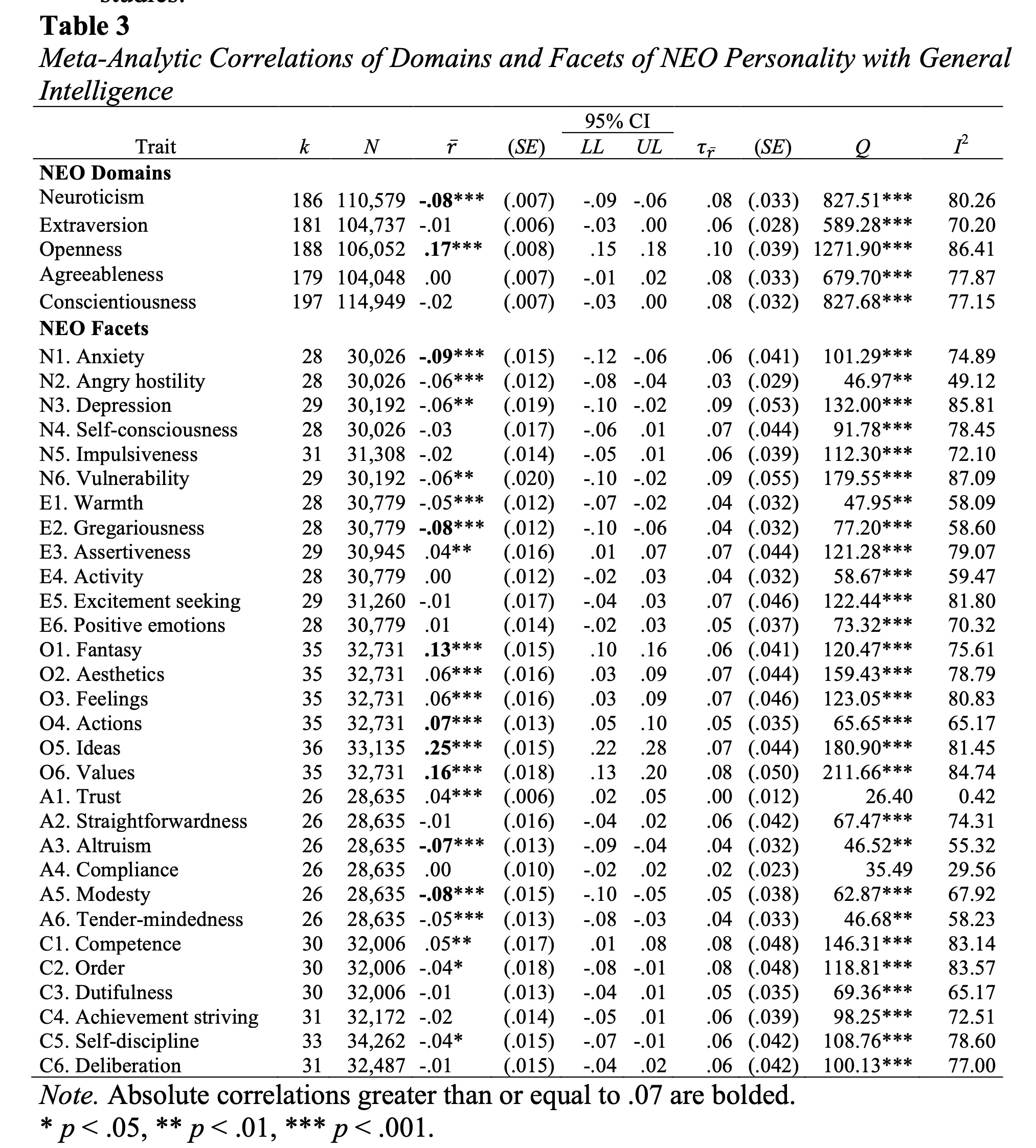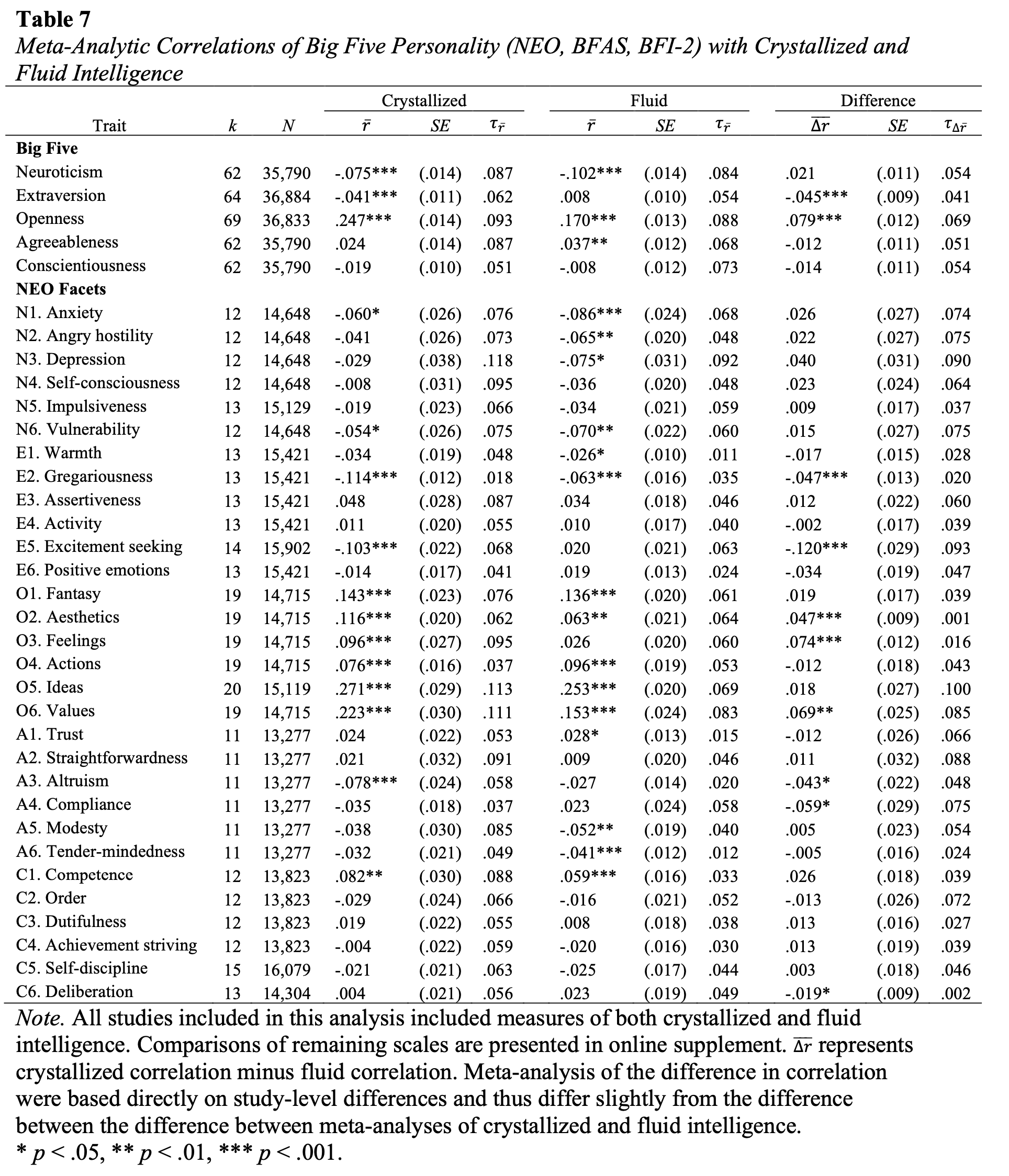Is there any relationship between intelligence and big five personality traits?
3 Answers
We just published a meta-analysis on the correlations between personality and intelligence in Psychological Bulletin (Anglim et al, 2022, PDF):
Anglim, J., Dunlop, P. D., Wee, S., Horwood, S., Wood, J. K., & Marty, A. (2022). Personality and intelligence: A meta-analysis. Psychological Bulletin, 148(5-6), 301. PDF
Big Five Correlations: The following table shows the meta-analytic correlations for the Big Five and intelligence. Specifically, of the Big Five, openness is the main correlate, but there are also notable negative correlations between neuroticism and intelligence. The other factors of the big five were effectively uncorrelated with intelligence. Note that while observed correlations are small to moderate, there are many processes that are likely to attenuate empirical correlations (e.g., the gap between self-report personality and objective measures of personality; the way that typical measures of intelligence fall short of gold standard measures of intelligence such as the WAIS; range restriction in some samples).
Facet correlations: Importantly, the meta-analysis showed that the relationship between personality and intelligence can be better understood at the facet-level (i.e., the narrower traits below the level of the Big Five). In particular, several of the Big Five that have no correlation at the domain level, have facets with opposing processes (e.g., assertiveness versus gregariousness; order versus competence; see also variations in openness facet correlates). The paper includes facet-level correlations for HEXACO, BFI-2, BFAS, and NEO PI measures of personality. Below you can see the NEO PI facet-level correlations (as this measure was the traditionally the most widely used, and thus provides the most robust estimates).
Fluid versus Crystallized intelligence: Importantly, correlations vary across fluid and crystallized intelligence (e.g., openness and especially facets related to aesthetics, feelings, and values are more related to crystallized intelligence).
Intelligence as measured by g is most associated with Openness, at modest levels, about r = .10-.15, meaning that only 1% of the variance of each is explained by the other.
I suppose this needs a more in-depth answer, but a quick search found one twin study (Bartels et al. 2012), which not only correlated IQ with Big5, but also tried to determine how much of that has a shared genetic basis:
Significant positive phenotypic correlations with IQ were seen for agreeableness (r = 0.21) and openness to experience (r = 0.32). A negative correlation emerged for neuroticism and IQ (r = 0.10). Genetic factors explained (nearly) all of the covariance between personality traits and IQ. Genetic correlations were 0.3–0.4 between IQ and agreeableness and openness. The genetic correlation between IQ and neuroticism was around 0.18. Thus, personality and IQ did not appear to be independent dimensions, and low neuroticism, high agreeableness and high scores on openness all contributed to higher IQ scores.
That paper also serves as mini-review of prior works:
Openness to experience tends to correlate highest with intelligence (Ackerman & Heggestad, 1997; Aitken Harris, 2004; Chamorro-Premuzic, Moutafi, & Furnham, 2005; Moutafi, Furnham, & Crump, 2006) [...] Results for other personality traits are less clear. Some studies reported negative associations between IQ and neuroticism (Austin, Hofer, Deary, & Eber, 2000; Kyllonen, 1997). Occasionally, extraversion has been reported to correlate (positively and negatively) with intelligence (Wolf & Ackerman, 2005), and this relation has been moderated by the nature of the test and the context (Bates & Rock, 2004; Matthews, 1997; Rawlings & Carnie, 1989; Robinson, 1985). Correlations of intelligence with conscientiousness have been small and negative (Furnham et al., 2005). Moutafi et al. (2006) hypothesized that conscientiousness is a trait that less intelligent individuals can possess to compensate in a competitive environment. Conscientiousness, in contrast, has been positively associated with academic performance (Chamorro-Premuzic & Furnham, 2003; Lievens et al., 2002). Agreeable people tend to be pleasant and accommodating in social situations and this trait is rarely associated with intelligence. However, one study found a small positive relation with scholastic achievement in adolescent males (Peterson, Pihl, Higgins, Seguin, & Tremblay, 2003). Altruistic behavior, which is a small aspect of the construct of agreeableness, was associated with higher IQ scores in younger children (Kohlberg, 1964; Krebs & Sturrup, 1982)
Regarding the compensation hypothesis between conscientiousness and IQ, a more recent review-ish paper, Murray et al. is critical of it, considering it an artefact of twin studies. Nevertheless, there's a more recent study Rammstedt et al., which (using OECD's PIAAC - "PISA for adults" as substitute for IQ) again found in favor of that compensation hypothesis; it also confirmed the positive correlation between Openness and cognitive ability and found a negative correlation with Neuroticism. It also found some moderators for these:
The cognitive ability-Openness relationship is moderated by educational attainment.
The association with Conscientiousness is moderated by labor force participation.
-
$\begingroup$ Out of interest when they mention positive correlation above: is it correlation actually or causation? (towardsdatascience.com/…) $\endgroup$– user23297Commented May 23, 2019 at 16:51
-
$\begingroup$ Correlation. The only study of those that tried to be more on the causation side was the one testing "genetic correlation". $\endgroup$ Commented May 23, 2019 at 17:17


